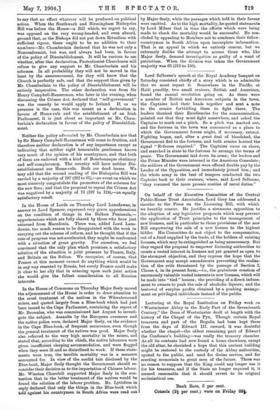In the House of Commons on Thursday Major Seely moved
the adjournment of the House in order to draw attention to the cruel treatment of the natives in the Witwatersrand mines, and quoted largely from a Blue-book which bad just been issued to the Cape Parliament, containing the report of Mr. Brownlee, who was commissioned last August to investi- gate the subject. Assaults by the European overseers and the native police were, declared Major Seely, on the evidence in the Cape Blue-book, of frequent occurrence, even though the general treatment of the natives was good. Major Seely also referred to the very high mortality in the mines, and stated that, according to the chiefs, the native labourers were given insufficient sleeping accommodation, and were flogged when they were i11 and so disinclined to work. If these state- ments were true, the terrible mortality was in a measure accounted for. In view of the sordid tale disclosed by the Blue-book, Major Seely thought the Government should re- consider their decision as to the importation of Chinese labour. Mr. Winston Churchill supported Major Seely in the con- tention that in the better treatment of the natives would be found the solution of the labour problem. Mr. Lyttelton in reply declared that only the things in the Blue-book which told against his countrymen in South Africa were• read out
by Major Seely, while the passages which told in their favour were omitted. As to the high mortality, he quoted statements by Lord Milner that in time the efforts which were being made to check the mortality would be successful. He con- cluded by appealing to Members not to condemn their fellow- countrymen in South Africa upon incomplete information. That is an appeal in which we entirely concur, but we extremely dislike the attempt to accuse those who, like Major Seely, demand investigation as guilty of a want of patriotism. When the division was taken the Government majority was 63 (213 to 150).










































 Previous page
Previous page